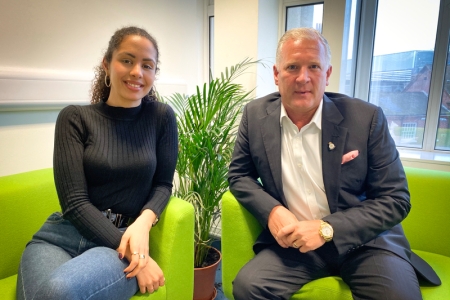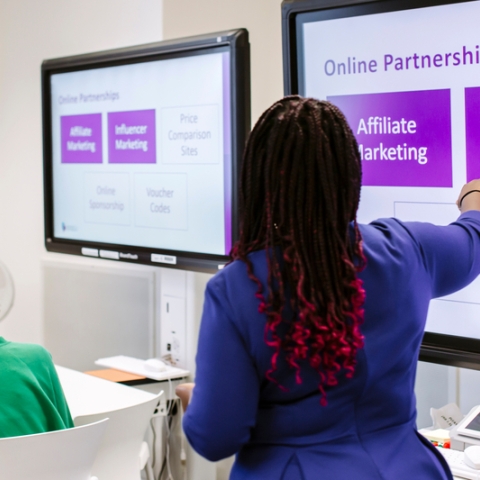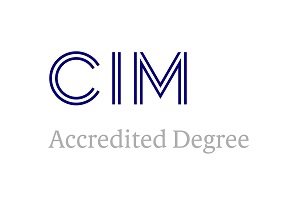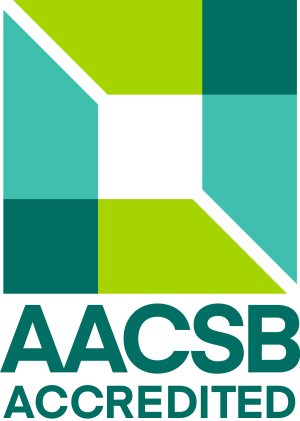
Key information
UCAS code:
N590
Typical offer:
112-120 UCAS points from 3 A levels, or equivalent
Showing content for section Overview
Overview
Develop the professional skills you need to become a modern digital marketer on this CIM and IDM accredited BA (Hons) Digital Marketing degree.
You’ll learn to create digital marketing strategies for any organisation, and stand out to employers with a varied portfolio of marketing projects and live client work after you graduate.
Explore the creative and analytical aspects of digital marketing, combine hands-on client experience with detailed marketing theory, and use industry tools such as the Adobe suite, Google Analytics, Hubspot and social media dashboards throughout the course.
You’ll learn to communicate with customers through digital platforms, and how to measure the performance of your communications with data and analytics. After your first year, you’ll choose specialist topics to focus on such as advertising or product development.
If you decide to complete an industrial placement year, you’ll graduate with a year of workplace experience as well as your degree knowledge. This paid placement takes place after your second or third year of study, and you’ll benefit from support from the University Careers and Employability service as well as our Placement Club.
You’ll hear from industry experts and guest speakers throughout the course, and graduate ready to make an impact in the industry.
"Digital marketing jobs were some of the fastest growing in the UK last year, according to data from LinkedIn, which shows a 52% rise in demand for such roles."
Course highlights
- Gain industry certifications in software packages and specific skills like SEO, Google Ads and social media platforms as part of your degree
- Make videos and podcasts, write social posts, create personas, visualise data and perfect search marketing as you study the full range of digital marketing tools
- Learn from teaching staff who have worked in the industry and are actively researching the rapidly changing world of digital marketing
- Work with real clients on live briefs as part of your assessments and in our marketing consultancy module
- Apply your learning and increase your employability with a paid placement year
- Benefit from expert industry speakers, from companies such as O2, TK Maxx and Gartner
I like the way the course is being taught and the structure. It connects theory and practice so you have not only theoretical knowledge, but you are also able to apply the knowledge within the real business environment.
90%
of graduates in work or further study 15 months after this course
(HESA Graduate Outcomes Survey 2018/19)
No. 3
influential business school in the world
Financial Times Teaching Power Rankings 2021
Accreditation
The Digital Marketing Institute (DMI) is the Global certification body for the digital marketing industry. Upon successful completion of the BA Digital Marketing Course you will exit with a Certified Digital Marketing Associate Certificate. The University of Portsmouth is the first University in the South East to offer the DMI Accreditation.
The Chartered Institute of Marketing (CIM) is the leading professional body for marketers worldwide and exists to develop the marketing profession, maintain professional standards and improve the skills of marketing practitioners. University of Portsmouth has joined forces with CIM to give students the opportunity to gain professional qualifications through the CIM Accredited Degree partnership. CIM qualifications are highly sought after by employers, and their content is reflected in our own degrees which ensures we are equipping students with the best opportunities for a successful marketing career.
Business and management studies at the University of Portsmouth is ranked 4th of the modern universities for research quality
Research Excellence Framework (REF) 2021
Contact information
Contact AdmissionsEntry requirements
BA (Hons) Digital Marketing entry requirements
Typical offers
- A levels - BBB-BBC
- UCAS points - 112-120 points from 3 A levels, or equivalent (calculate your UCAS points)
- T-levels - Merit
- BTECs (Extended Diplomas) - DDM-DMM
- International Baccalaureate - 29
You may need to have studied specific subjects – find full entry requirements and other qualifications we accept.
English language requirements
- English language proficiency at a minimum of IELTS band 6.0 with no component score below 5.5.
See alternative English language qualifications.
We also accept other standard English tests and qualifications, as long as they meet the minimum requirements of your course.
If you don't meet the English language requirements yet, you can achieve the level you need by successfully completing a pre-sessional English programme before you start your course.
Typical offers
- A levels - BBB-BBC
- UCAS points - 112-120 points from 3 A levels, or equivalent (calculate your UCAS points)
- T-levels - Merit
- BTECs (Extended Diplomas) - DDM-DMM
- International Baccalaureate - 29
You may need to have studied specific subjects or GCSEs - see full entry requirements and other qualifications we accept.
English language requirements
- English language proficiency at a minimum of IELTS band 6.0 with no component score below 5.5.
See alternative English language qualifications.
We also accept other standard English tests and qualifications, as long as they meet the minimum requirements of your course.
If you don't meet the English language requirements yet, you can achieve the level you need by successfully completing a pre-sessional English programme before you start your course.
We look at more than just your grades
While we consider your grades when making an offer, we also carefully look at your circumstances and other factors to assess your potential. These include whether you live and work in the region and your personal and family circumstances which we assess using established data.
Ideal skills and qualities for this course
We're looking for people who are interested in how organisations interact with their consumers and who are curious about the power of data.
Students who do well on this course are those who are adaptable and proactive. We want you to show us that you'll actively engage in your learning and show commitment to honing your skills. An interest in problem solving is key, but we'll help you develop these skills as you learn.
Experience with creative tools or software is useful but not essential as you'll get all the support you need to develop your skills on the course.
My favourite part of my course is learning new technical creative skills. Before starting, I wasn’t sure if I had the right creative or technical skills. I quickly saw that everyone starts off equally and we learn in stages. I was encouraged to be creative at my own pace and this has helped me gain more confidence in my abilities.
Careers and opportunities
You'll graduate from this course with projects and certificates to demonstrate your competence with tools and you'll have real-world experience to talk about in interviews. That experience might be through a work placement, or through our marketing consultancy project module.
You can be confident that, as industry tools evolve over the lifetime of your degree, we'll ensure your skills are up-to-date and that you have strong foundations of marketing theory to build on.
"Steep rise in demand for marketers with digital skills; marketers are rapidly upskilling in social media, ecommerce and data analytics as they look to respond to consumers shift online."
Previous graduates of this course have got jobs such as:
- digital engagement manager
- campaign assistant
- marketing assistant
- paid social senior account executive
- commercial marketing executive
- digital marketer
- content creator
- social media executive
- SEO analyst
Graduates of this course have gone on to work for companies such as:
- Awin Global Marketing
- Merlin Entertainment
- IBM
- Cineworld
- Virgin Active
- Zoopla
- ACF Technologies
You could also choose to continue your studies at postgraduate level, or set up your own business with help and support from the University.

Ongoing career support – up to 5 years after you graduate
Get experience while you study, with support to find part-time jobs, volunteering opportunities, and work experience.
Towards the end of your degree and for up to five years after graduation, you’ll receive one-to-one support from our Graduate Recruitment Consultancy to help you find your perfect role.

What can you do with a Digital Marketing degree?
Read our blog to find out what digital marketing is, why you should study it, and what jobs you could do in this ever-growing field.
Read the blog
Work placement year
After your second or third year, you can do an optional paid work placement year to get valuable work experience in the digital marketing industry.
We've got loads of links with the industry. Previous students have taken a placement year with companies such as:
- Take Two Interactive (games publisher)
- Pfizer
- Amazon
- The Walt Disney Company
- Universal Production Music
- Nintendo
- Honda
- Phillips 66
- Bosch
Many of our students are offered graduate jobs by their placement employers.
The average salary for a 12-month paid placement is £19,800 for students in the Faculty of Business and Law. It could be more or less than this amount depending on your placement. You'll only pay a very small percentage of your tuition fee for this year.
Interested in running your own business on your placement year instead? You can start up and run your own company for a year as an alternative to a work-based placement. You'll work alone or with fellow students to build and launch a successful venture.

As a Marketing Associate at SAP Concur I really enjoyed being able to participate in projects that not only developed my skills but also provided value to the business. Having the opportunity to work within a marketing team greatly developed my business knowledge.
Ways to enrich your study

Entrepreneurs in Residence Programme (EiR)
We have over 20 experienced business entrepreneurs on our free EiR programme who can help you develop your business idea.
"I have a business idea, but I was not too sure about it. After this meeting, I felt so encouraged and positive about it! I felt so motivated to pursue my business venture. He gave me real life advice and helped me how to approach my ideas."
Rabab El Habchi Mahir meeting EiR Mark Smith

Study abroad year
Between your second and third year, you can choose to study abroad at one of our partner universities in Europe, Asia, Australia or North America. All classes are delivered in English and you'll still be able to get both your tuition fee and maintenance loans. You may also qualify for a government travel grant.
"Students that go abroad are more likely to obtain first-class honours [and] more likely to be in graduate employment than their non-mobile peers."
Universities UK International: 'Gone International, Rising Aspirations', 2019
Modules
Each module on this course is worth a certain number of credits.
In each year, you need to study modules worth a total of 120 credits. For example, four modules worth 20 credits and one module worth 40 credits.
What you'll study
Core modules
Students delve into the realms of debate and critical thinking in the context of marketing and International Business studies.
In this module, students engage in a collaborative virtual project with peers from partnering international universities. This experience allows students to enhance their virtual collaboration skills, cultivate cross-cultural awareness and hone their interpersonal communication abilities — essential for their future in business.
The module tutors act as personal tutors, supporting students in their progress and welfare requirements. The skills and knowledge gained in this module directly complement other core modules studied in the first year along with fostering important employability and career management expertise.
Core modules
The module will develop creative design and digital skills development and enhancement, with an emphasis on educational technologies to assist core and future skills for employability success.
The module emphasises a practical and creative approach, offering a blend of theoretical concepts and hands-on experience. Through workshops and practical assessments, students will develop the skills and knowledge required to produce responsible, sustainable, and ethical marketing messages, campaigns, and brand guidelines, thereby building a diverse portfolio of creative materials suitable for the workplace.
Furthermore, students will harness their understanding of the customer and the market to craft data visualisations that simplify complex information and empower users to interact with data effectively.
Optional modules
Explore event theories and planning models as you develop theoretical knowledge and hands-on skills for successfully planning, marketing and executing events.
Through group projects that mirror the way you'll work in industry, you’ll explore a range of event types and tailor your marketing plans to suit their needs — whether for business, cultural, or sporting events.
Gain hands on experience putting theory into practice, and using product management tools and frameworks to develop your own creative new product idea.
With assessments centered on analysing real organisations, you’ll evaluate decisions related to resourcing, positioning and launch - leaving you equipped to prepare watertight business cases for investment.
Upon completion, you'll have the strategic vision and product innovation skills to help brands create a portfolio of profitable new products.
Core modules
These key skills include:
- Research and critical analysis skills
- A range of communication skills (written & oral)
- Problem solving (quantitative and qualitative) skills
The module addresses UoP Hallmarks 1, 2, 3, 4 and 8.
Optional modules
Exploring the models and best practices related to ideation, development and launch, you’ll understand the processes that bring ideas to market.
Analysing factors from sustainability to globalisation, you’ll tackle the contemporary issues impacting development in the modern landscape. This module will equip you with understanding to give you a cutting edge in the jobs market.
With assessments focused on addressing real-world cases, you'll boost your strategic skills to manage initiatives smoothly from vision to rollout, leaving you prepared to champion disruption responsibly across industries ahead.
After your second or third year, you can do an optional work placement year to get valuable longer-term work experience in the industry.
We’ll help you secure a work placement that fits your aspirations, and you’ll get mentoring and support throughout your year of work.
When you graduate after successfully completing a placement year, your degree transcript and degree certificate will state that your degree is `in the sandwich mode'.
Changes to course content
We use the best and most current research and professional practice alongside feedback from our students to make sure course content is relevant to your future career or further studies.
Therefore, some course content may change over time to reflect changes in the discipline or industry. If a module doesn't run, we'll let you know as soon as possible and help you choose an alternative module.
Alternative marketing courses
Not quite sure this course is right for you? Take a look at our other marketing courses to compare your options.
If you want to explore a broader range of offline marketing disciplines and gain an understanding of business operations alongside your marketing knowledge take a look at our BA (Hons) Marketing degree.
Your facilities
Technology Enhanced Active Learning (TEAL) room
Our technology enhanced active learning space promotes social learning.

Business Simulation Suite
Experience the boardroom in our replica business suite.

Teaching
Around 20% of your timetabled teaching will be online.
The majority of your learning will be face-to-face and will include:
- lectures
- workshops
- seminars
- ICT sessions
In this course there's an emphasis on using the latest software and tech to support your learning and develop your practical knowledge.
We pride ourselves on the academic support we offer our students. You'll have a personal tutor, student engagement officers and study support staff to help you throughout your studies.
Assessment
Your assessment will depend on which modules you take. Assessment methods are likely to include:
- portfolio work
- projects
- live client work
- presentations
- group work
- essays
- examinations
- multiple-choice tests
Teaching staff profiles
These are some of the expert staff who’ll teach you on this degree course.
How you'll spend your time
One of the main differences between school or college and university is how much control you have over your learning.
We use a blended learning approach to teaching, which means you’ll take part in both face-to-face and online activities during your studies. As well as attending your timetabled classes you'll study independently in your free time, supported by staff and our virtual learning environment, Moodle.
A typical week
We recommend you spend at least 35 hours a week studying for this degree.
Your total study time will depend on the modules that you take, but in your first year this is what your week may look like:
- timetabled teaching activities (lectures, seminars, tutorials, classes and workshops) = about 13 hours a week
- independent study (research, reading, coursework and project work, alone or in a group) = about 22 hours a week
You'll probably do more independent study and have less scheduled teaching in years 2 and 3, but this depends on which modules you choose.
Term dates
The academic year runs from September to June. There are breaks at Christmas and Easter.
Supporting you
The amount of timetabled teaching you'll get on your degree might be less than what you're used to at school or college, but you'll also get support via video, phone and face-to-face from teaching and support staff to enhance your learning experience and help you succeed. You can build your personalised network of support from the following people and services:
Types of support
Your personal tutor helps you make the transition to independent study and gives you academic and personal support throughout your time at university.
As well as regular scheduled meetings with your personal tutor, they're also available at set times during the week if you want to chat with them about anything that can't wait until your next meeting.
In addition to the support you get from your personal tutor, you'll also have access to our student engagement officers. They can give you confidential, impartial advice on anything to do with your studies and personal wellbeing, and refer you to specialist support services if you need extra help or support.
You'll have help from a team of study support tutors. Based within the Faculty of Business and Law, these tutors are familiar with the specific requirements your assignments and work closely with faculty academics. This means they can give you focused support with the specific study skills you need to be successful on your course. They're available face-to-face, by phone, email, and by video call.
They can help with:
- Academic writing (for example, essays, reports, dissertations, projects and literature reviews)
- Reflective writing skills
- Critical thinking skills
- Delivering presentations (including observing and filming presentations)
- Understanding and using assignment feedback
- Managing your time and workload
- Revision and exam techniques
If you're a mature student, specialist support to help you return to learning is available.
As well as support from faculty staff and your personal tutor, you can use the University's Academic Skills Unit (ASK).
ASK provides one-to-one support in areas such as:
- academic writing
- note taking
- time management
- critical thinking
- presentation skills
- referencing
- working in groups
- revision, memory and exam techniques
Library staff are available in person or by email, phone, or online chat to help you make the most of the University's library resources. You can also request one-to-one appointments and get support from librarians who specialise in business and law.
The library is open 24 hours a day, every day, in term time.
Our online Learning Well mini-course will help you plan for managing the challenges of learning and student life, so you can fulfil your potential and have a great student experience.
You can get personal, emotional and mental health support from our Student Wellbeing Service, in person and online. This includes 1–2–1 support as well as courses and workshops that help you better manage stress, anxiety or depression.
If you require extra support because of a disability or additional learning need our specialist team can help you.
They'll help you to
- discuss and agree on reasonable adjustments
- liaise with other University services and facilities, such as the library
- access specialist study skills and strategies tutors, and assistive technology tutors, on a 1-to-1 basis or in groups
- liaise with external services
If English isn't your first language, you can do one of our English language courses to improve your written and spoken English language skills before starting your degree. Once you're here, you can take part in our free In-Sessional English (ISE) programme to improve your English further.
Course costs and funding
Tuition fees
- UK/Channel Islands and Isle of Man students – £9,250 a year (may be subject to annual increase)
- EU students – £9,250 a year, including our Transition Scholarship (may be subject to annual increase)
- International students – £17,200 a year (subject to annual increase)
You won't pay any extra tuition fees to another university for taking part in a study/work abroad activity if you choose to do it for the whole academic year. During a year abroad you'll only have to pay a reduced fee to the University of Portsmouth.
- UK/Channel Islands and Isle of Man students – £9,250 a year (may be subject to annual increase)
- EU students – £9,250 a year, including our Transition Scholarship (may be subject to annual increase)
- International students – £17,200 a year (subject to annual increase)
You won't pay any extra tuition fees to another university for taking part in a study/work abroad activity if you choose to do it for the whole academic year. During a year abroad you'll only have to pay a reduced fee to the University of Portsmouth.
Funding your studies
Find out how to fund your studies, including the scholarships and bursaries you could get. You can also find more about tuition fees and living costs, including what your tuition fees cover.
Applying from outside the UK? Find out about funding options for international students.
Additional course costs
These course-related costs aren’t included in the tuition fees. So you’ll need to budget for them when you plan your spending.
Additional costs
Our accommodation section show your accommodation options and highlight how much it costs to live in Portsmouth.
You’ll study up to 6 modules a year. You may have to read several recommended books or textbooks for each module.
You can borrow most of these from the Library. If you buy these, they may cost up to £60 each.
We recommend that you budget £75 a year for photocopying, memory sticks, DVDs and CDs, printing charges, binding and specialist printing.
If your final year includes a major project, there could be cost for transport or accommodation related to your research activities. The amount will depend on the project you choose.
You’ll need to cover additional costs, such as travel costs, if you take an optional placement or placement abroad.
These costs will vary depending on the location and duration of the placement, and can range from £50–£1000.
During your placement year or study abroad year, you’ll be eligible for a discounted rate on your tuition fees. Currently, tuition fees for that year are:
- UK/Channel Islands and Isle of Man students – £1,385 a year (may be subject to annual increase)
- EU students – £1,385 a year, including Transition Scholarship (may be subject to annual increase)
- International students – £2,875 a year (subject to annual increase)
The costs associated with your specific destination will be discussed during your second year, as well as possible sources of additional funding.
Apply
How to apply
To start this course in 2024, apply through UCAS. You'll need:
- the UCAS course code – N590
- our institution code – P80
If you'd prefer to apply directly, use our online application form.
You can also sign up to an Open Day to:
- Tour our campus, facilities and halls of residence
- Speak with lecturers and chat with our students
- Get information about where to live, how to fund your studies and which clubs and societies to join
If you're new to the application process, read our guide on applying for an undergraduate course.
To start this course in 2025, apply through UCAS. You'll need:
- the UCAS course code – N590
- our institution code – P80
If you'd prefer to apply directly, use our online application form.
You can also sign up to an Open Day to:
- Tour our campus, facilities and halls of residence
- Speak with lecturers and chat with our students
- Get information about where to live, how to fund your studies and which clubs and societies to join
If you're new to the application process, read our guide on applying for an undergraduate course.
Applying from outside the UK
As an international student you'll apply using the same process as UK students, but you’ll need to consider a few extra things.
You can get an agent to help with your application. Check your country page for details of agents in your region.
Find out what additional information you need in our international students section.
If you don't meet the English language requirements for this course yet, you can achieve the level you need by successfully completing a pre-sessional English programme before you start your course.
Admissions terms and conditions
When you accept an offer to study at the University of Portsmouth, you also agree to abide by our Student Contract (which includes the University's relevant policies, rules and regulations). You should read and consider these before you apply.






